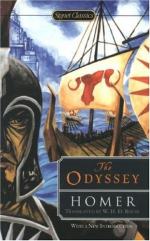So successful was this school, that Homer realised a considerable fortune. He married, and had two daughters, one of whom died single, the other married a Chian.
The following passage betrays the same tendency to connect the personages of the poems with the history of the poet, which has already been mentioned:—
“In his poetical compositions Homer displays great gratitude towards Mentor of Ithaca, in the Odyssey, whose name he has inserted in his poem as the companion of Ulysses, in return for the care taken of him when afflicted with blindness. He also testifies his gratitude to Phemius, who had given him both sustenance and instruction.”
His celebrity continued to increase, and many persons advised him to visit Greece whither his reputation had now extended. Having, it is said, made some additions to his poems calculated to please the vanity of the Athenians, of whose city he had hitherto made no mention, he set out for Samos. Here, being recognized by a Samian, who had met with him in Chios, he was handsomely received, and invited to join in celebrating the Apaturian festival. He recited some verses, which gave great satisfaction, and by singing the Eiresione at the New Moon festivals, he earned a subsistence, visiting the houses of the rich, with whose children he was very popular.
In the spring he sailed for Athens, and arrived at the island of Ios, now Ino, where he fell extremely ill, and died. It is said that his death arose from vexation, at not having been able to unravel an enigma proposed by some fishermen’s children.
Such is, in brief, the substance of the earliest life of Homer we possess, and so broad are the evidences of its historical worthlessness, that it is scarcely necessary to point them out in detail. Let us now consider some of the opinions to which a persevering, patient, and learned—but by no means consistent—series of investigations has led. In doing so, I profess to bring forward statements, not to vouch for their reasonableness or probability.
“Homer appeared. The history of this poet and his works is lost in doubtful obscurity, as is the history of many of the first minds who have done honour to humanity, because they rose amidst darkness. The majestic stream of his song, blessing and fertilizing, flows like the Nile, through many lands and nations; and, like the sources of the Nile, its fountains will ever remain concealed.”
Such are the words in which one of the most judicious German critics has eloquently described the uncertainty in which the whole of the Homeric question is involved. With no less truth and feeling he proceeds:—
“It seems here of chief importance to expect no more than the nature of things makes possible. If the period of tradition in history is the region of twilight, we should not expect in it perfect light. The creations of genius always seem like miracles, because they are, for the most part, created far out of the reach of observation. If we were in possession of all the historical testimonies, we never could wholly explain the origin of the Iliad and the Odyssey; for their origin, in all essential points, must have remained the secret of the poet.”




